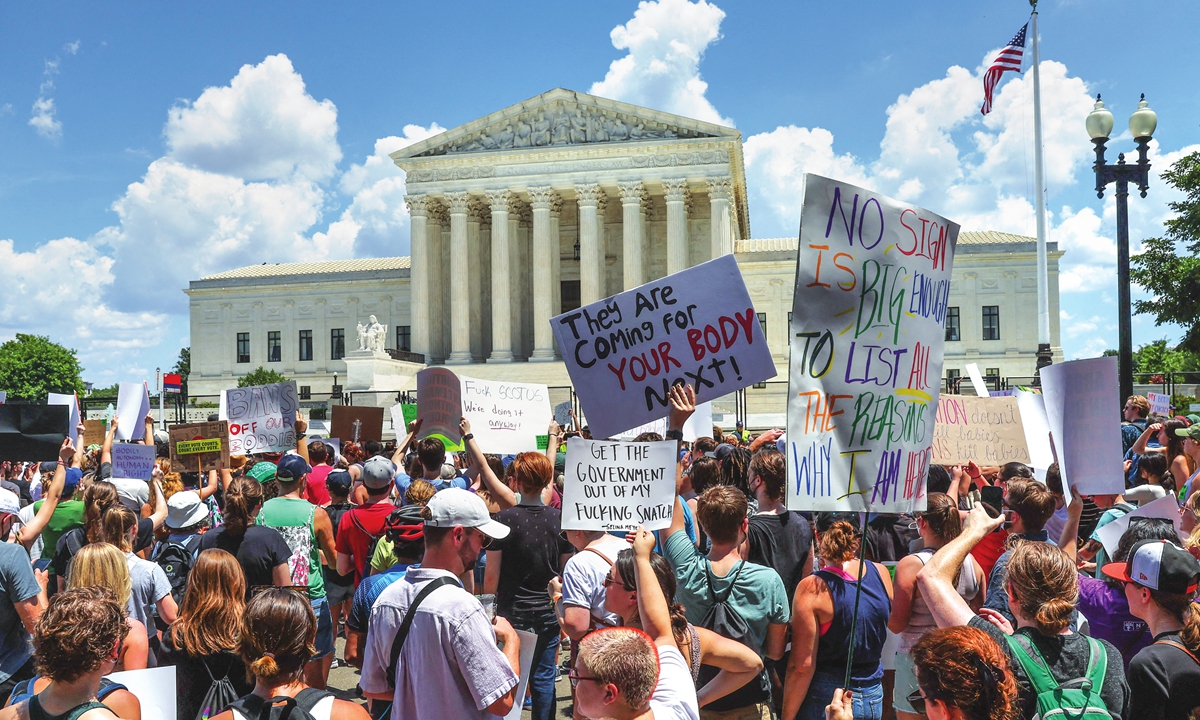US Supreme Court's abortion ruling decried as 'historical regression'
Divisive decision a denial of Americans’ basic human rights: expert

Protesters gather in the wake of the decision overturning the landmark Roe v. Wade outside the US Supreme Court on June 25, 2022 in Washington, DC. Photo: AFP
Following the controversial ruling on gun control, the US Supreme Court's decision to overturn the half-century-old Roe v. Wade precedent serves as a new lead that pushes the US much closer to a critical divide resulting from the melee between conservative and liberal forces. Chinese observers believe such a "regression" in the country that claims itself as "beacon of freedom" also sheds light on the twisted nature of US politics.
As fissures grow deeper in the US, experts said the country is already experiencing a "war" on a cultural and political level, and the US, a "master of creating external conflict to give vent to its internal contradictions," may be prone to meddling in the affairs of more countries, and the experts warned that the US could take more risky moves to contain China, the top rival it deems, to divert attention from its domestic troubles.
Soon after the US Supreme Court abolished the constitutional right to abortion more than 50 years after it was established, 26 states have established laws that indicate they could outlaw or set extreme limits on abortions, effectively banning abortion in those states, according to the Guttmacher Institute, CNN reported on Sunday.
On Saturday, hundreds of protesters descended on the US Supreme Court to denounce the justices' decision, according to Reuters. It reported that crowds carried posters with slogans such as "Abort SCOTUS." One protester carried a placard that said "Limit guns, not women" in reference to another Supreme Court decision this week expanding gun rights.
President Joe Biden, who on Friday expressed his deep disappointment with the court ruling on abortion, said on Saturday that the White House will monitor how states enforce bans, with administration officials having already signaled that they plan to fight attempts to prohibit a pill used for medication abortion.
At a rally in western Illinois on Saturday, former President Donald Trump praised the Supreme Court ruling, calling it "a victory for the Constitution, a victory for the rule of law and above all a victory for life."
The Supreme Court's decision to overturn the Roe v. Wade precedent in essence gives conservative states more legal basis to limit abortion, and is a great denial of American people's basic human rights, said Diao Daming, associate professor at the Renmin University of China in Beijing. He called the move a huge step forward toward polarized politics, as it has put basic human rights issues into a debate between two parties. "It is clearly a historical regression."
The reversal came a day after another divisive decision in which the court struck down a century-old New York state law requiring an individual to show "proper cause" to carry a concealed gun in public, deeming the statute unconstitutional.
The rulings together shed light on the strong momentum of conservative power within the court, cemented by Trump's three appointments, a professor from the Institute of International Relations at the China Foreign Affairs University in Beijing told the Global Times on condition of anonymity, noting that the growing antagonism between conservatism and liberalism and the irreconcilable contradictions between Democrats and Republicans are the driving force tearing the country apart.
One example of the increasingly irreconcilable contradictions is that Biden previously said, "I do not view abortion as a choice and a right. I think it's always a tragedy," in a videotaped interview with Texas Monthly in 2006 broadcast by CNN on Thursday. His old remarks stand in contrast with his current strong stance, vowing to try to preserve access to abortion after the Supreme Court's decision.
The expert also said that the embarrassing fact the self-professed "beacon of freedom" took away the right to abortion in 2022 gives the world a peek into the US' twisted politics, where fierce bipartisan struggle is leading the country into a deeper chasm.
A user of China's Twitter-like platform Sina Weibo said that the Supreme Court's decision has made the divided US more dangerous, "I say without exaggeration, maybe the US will see the coming of a civil war."
"Hard to say if a civil war will really come to the US, but it's safe to say that the US has already been in a civil war situation on cultural and political fronts," said the anonymous professor, noting that there more complicated, dramatic conflicts are yet to come in the US.
Furthermore, Conservative Justice Clarence Thomas suggested the court's reasoning could also lead it to reconsider past rulings protecting the right to contraception, legalizing gay marriage nationwide, and invalidating state laws banning gay sex, according to Reuters.
Stimulus of hostility
Faced with the simmering internal conflict, the US is likely to seek to ease it by creating conflicts overseas to give vent to the pressure, build unity inside and win time for a longer term solution to be found, said the anonymous expert, pointing out that upping the ante in pressuring China, its biggest imaginary enemy, may be an option.
This view was echoed by Wei Nanzhi, a research fellow of the American Institute from the Chinese Academy of Social Sciences in Beijing. She told the Global Times that US politics has flexibility, and when its national strength is waning and domestic conflict is being ramped up, it tends to concentrate on targeting its major "opponents," as it did when it confronted the USSR.
The Democrats and Republicans, despite their many irreconcilable differences, share a similar stance and interest in foreign expansion, according to Wei.
In an exclusive interview with the Global Times, Zheng Yongnian, professor at the Chinese University of Hong Kong, Shenzhen, and president of the Institute for International Affairs, Qianhai, told the Global Times that historically, when the US was doing well at home, its diplomacy tended to be rational.
When it faced a lot of domestic problems, it [the US] would divert its conflicts to international relations. The present China-US relationship is such a victim, said Zheng.
He noted that US elites are also aware that the deterioration in China-US relations and the trade war it launched against China have failed to solve the US' domestic problems to any extent. Even if the US fully decouples from China, as the Biden administration has planned, its problems will only worsen rather than improve.
The anonymous expert added that the US may be cautious in using overseas conflicts as a "buffer board' for its internal problems, as any crisis it creates outside its borders may backfire and add fuel to its domestic conflicts.



